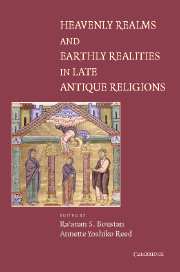Book contents
- Frontmatter
- Contents
- Preface
- List of Contributors
- Introduction: “In Heaven as It Is on Earth”
- PART ONE BETWEEN EARTH AND HEAVEN
- PART TWO INSTITUTIONALIZING HEAVEN
- PART THREE TRADITION AND INNOVATION
- 11 Angels in the Architecture: Temple Art and the Poetics of Praise in the Songs of the Sabbath Sacrifice
- 12 The Collapse of Celestial and Chthonic Realms in a Late Antique “Apollonian Invocation” (PGM I 262–347)
- 13 In Heaven as It Is in Hell: The Cosmology of Seder Rabbah di-Bereshit
- 14 The Faces of the Moon: Cosmology, Genesis, and the Mithras Liturgy
- 15 “O Paradoxical Fusion!”: Gregory of Nazianzus on Baptism and Cosmology (Orations 38–40)
- Select Bibliography
- Index
15 - “O Paradoxical Fusion!”: Gregory of Nazianzus on Baptism and Cosmology (Orations 38–40)
Published online by Cambridge University Press: 14 July 2009
- Frontmatter
- Contents
- Preface
- List of Contributors
- Introduction: “In Heaven as It Is on Earth”
- PART ONE BETWEEN EARTH AND HEAVEN
- PART TWO INSTITUTIONALIZING HEAVEN
- PART THREE TRADITION AND INNOVATION
- 11 Angels in the Architecture: Temple Art and the Poetics of Praise in the Songs of the Sabbath Sacrifice
- 12 The Collapse of Celestial and Chthonic Realms in a Late Antique “Apollonian Invocation” (PGM I 262–347)
- 13 In Heaven as It Is in Hell: The Cosmology of Seder Rabbah di-Bereshit
- 14 The Faces of the Moon: Cosmology, Genesis, and the Mithras Liturgy
- 15 “O Paradoxical Fusion!”: Gregory of Nazianzus on Baptism and Cosmology (Orations 38–40)
- Select Bibliography
- Index
Summary
O new mixture! O paradoxical fusion!
(Gregory of Nazianzus, On the Nativity 38.13)“I attest before God and the elected angels” that you will be baptized with this faith. If one has written in you something other than my sermon has set out, come here, so what has been written in you will be modified. I am not without talent to write that into you; I write what has been written into me.
(Gregory of Nazianzus, On Baptism 40.44)In thinking about the theme of this volume, it has been my principal interest to investigate how men who belonged to the Greek-speaking elites of the later Roman Empire, such as Gregory of Nazianzus, understood and expressed notions of “heavenly realms and earthly realities.” Specifically, how did Gregory of Nazianzus conceptualize instances in which the two realms met, and how did he perceive his role in bringing about such “meetings”? The answer to these questions points to a larger issue: How did Gregory and others like him understand salvation and the mechanisms by which it was achieved? For Gregory, a proper understanding of the manner in which the imagined realms of the (Neo-)Platonic cosmic spheres could intersect with the material realm below them was essential for attaining salvation. Each individual could actualize this process of salvation within himself or herself, but only by fully comprehending the mystery exemplified in the unprecedented merging of the two realms in the Incarnation.
- Type
- Chapter
- Information
- Heavenly Realms and Earthly Realities in Late Antique Religions , pp. 296 - 316Publisher: Cambridge University PressPrint publication year: 2004
- 2
- Cited by

